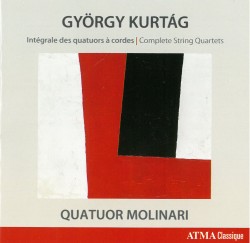 György Kurtág – String Quartets
György Kurtág – String Quartets
Quatuor Molinari
ATMA ACD2 2706
Review
Founded 19 years ago, Montreal’s Quatuor Molinari has become one of Canada’s pre-eminent interpreters of 20th- and 21st-century classical compositions, including those by Canadians. In this album however, they venture deep into the string quartet’s European-home geographic and aesthetic landscape.
Like his composer friend and colleague György Ligeti, the multiple-award-winning Hungarian composer György Kurtág (b. 1926) fled his home country following the October 1956 Hungarian uprising. Part of an exodus of a wave of some 200,000 Hungarians, Kurtág used his exile productively as an opportunity to study composition in Paris with Olivier Messiaen and Darius Milhaud. There he also discovered the modernist compositions of Anton Webern and plays of Samuel Beckett. These influences proved decisive in his chosen career.
On returning to Budapest, Kurtág composed his first String Quartet (1959). Dedicated to his psychotherapist Marianne Stein, the work is strongly redolent of the music of the Second Viennese School, while still expressing a personal compositional voice. Webern and Schoenberg can be heard throughout its disjunct dodecaphonic tonal language, its expressive extremes. The work’s tense, dramatic yet aphoristic six movements are riddled with enigmatic, destabilizing silences. It remains a very satisfying – emotional even – listen today. The composer dubbed it his Opus 1, its success launching his career internationally. Quatuor Molinari gives it a precise, clear rendering filled with a light-handed virtuosity, evident commitment and soul.
Kurtág followed his String Quartet with a number of works for these forces. Like his first opus, almost all reference composers, musicians and friends he admired. All are represented here. We hear an aesthetic continuity, certainly, but also one of technique and tone, though in later works hints of tonality peak through the skittering introspection. Kurtág’s music is superbly represented on this CD by Quatuor Molinari.



